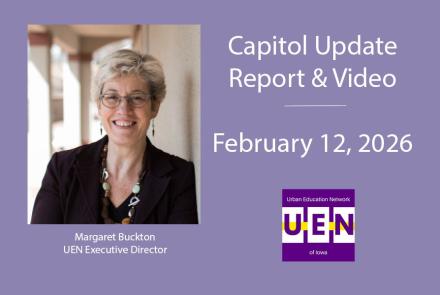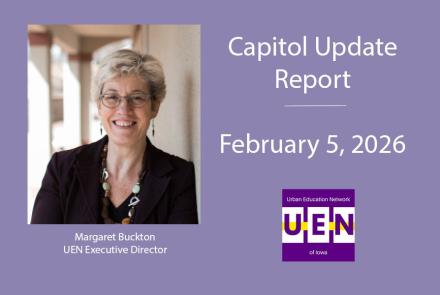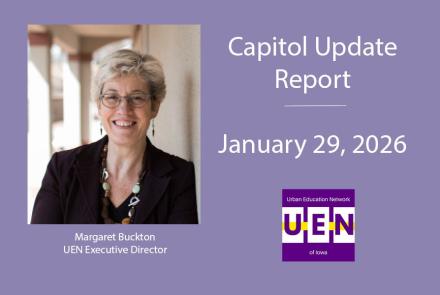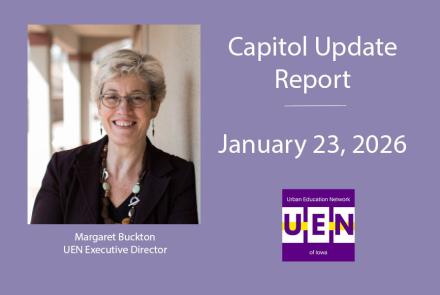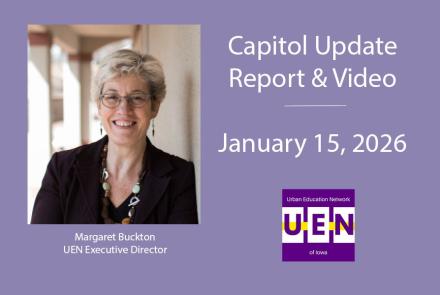Capitol Update - January 15, 2021
UEN Legislative Update
January 15, 2021
In this UEN Report of the first week of the 2021 Legislative Session, find information about:
- Education Highlights from Governor Reynolds Condition of the State
- The Governor’s Budget Recommendation for FY 2022 and FY 2023
- Specifics about State School Aid and School Choice in the Recommendation
- Pre-filed Bills
- New Bills Introduced
- Finding Biographical and Contact Information for your Legislators
- Advocacy Resources
Download the full report January 15, 2021 Legislative Update Report
Governor’s 2021 Condition of the State: Governor Reynolds delivered her condition of the state address on Jan. 12 at 6:00 PM. Iowa Public Radio has video of the speech here (she begins speaking a 4:26 into the recording): https://www.iowapublicradio.org/ipr-news/2021-01-11/watch-gov-reynolds-delivers-condition-of-the-state-address-at-6-p-m and her remarks are posted on the IPR web site here: https://www.iowapublicradio.org/ipr-news/2021-01-12/read-gov-kim-reynolds-2021-condition-of-the-state-address
Gov. Reynolds looked back at 2020; “It’s been a year—and I’ll let you fill in whatever adjective you want. Covid-19. Civil Unrest. A drought. A derecho. We’ve been beaten and battered in about every way imaginable and some unimaginable. But together, we’ve met every challenge with bravery and outright grit.” She celebrated several school districts and educators taking extraordinary steps to engage students, serve families and meet challenges. She did, however, make the following statement regarding school choice:
“Make no mistake, it’s imperative that we have a strong public school system—which is why we have and will continue to prioritize school funding while many other states are cutting their education budgets. But school choice isn’t a zero-sum game. It has the potential to raise the quality for all schools. And for those schools that do fall behind, it ensures our children don’t fall with them. Let’s work together to make sure every child receives a quality education, regardless of income, and no matter their zip code.”
Gov. Reynolds mentioned some but not all of the recommended policies that follow. We share the details known at this time, but until we see proposed legislation, there isn’t much substance here. We are sharing what is written, found in the Iowa Department of Management Budget in Brief book linked here: https://dom.iowa.gov/sites/default/files/documents/2021/01/bib_fy2022-fy2023_final.pdf
Her comments included the following references to education:
- Students First Act: mandate that school accommodate parent choice for 100% in person instruction five days a week
- Open Enrollment: adds a good cause exemption to March 1 deadline for students at risk of serious academic failure who haven’t received adequate support from the school and add another open enrollment deadline for students attending failing schools defined by Iowa School Performance Profiles
- Voluntary Transfer Ban: eliminate diversity plans in five districts that regulate open enrollment out based on income (Davenport, Des Moines, Postville and Waterloo or in West Liberty’s case, ELL is the metric)
- Charter Schools: tuition free public charter schools open to all students that provide greater flexibility to serve a diverse and changing student population. Promote classroom innovation and flexibility. Allow a nonprofit or group of community members/parents to apply through the state BOE to open a school held to high standards outlined in their charter.
- Innovative Waivers: promote the use of innovative waivers to grant districts flexibility to include non-traditional learning opportunities such as STEM/STEAM and work-based learning and provide new funding flexibility that is only available with the innovative waivers)
- Education Savings Account (ESAs): per student funds put in an account for parent use for those students currently attending or will be entering kindergarten at a school identified as needing Comprehensive Support and Improvement based on ESSA.
- Attendance and Funding: utilize federal relief funds to implement a statewide student information system and improve overall school data management, including attendance and update the per student funding methodology based on ongoing attendance.
- School Board Accountability: amend Iowa Code to include language stating school boards are responsible for student improvement and achievement.
Governor’s Budget: The following information is found in the Legislative Services Agency’s Preliminary Summary of the Governor’s Budget Recommendation, Jan. 12, 2021, located on their web site here: https://www.legis.iowa.gov/docs/publications/LAGRP/1208512.pdf
Governor Reynolds Budget Recommendation covers three fiscal years and the following provisions impact PK-12 schools:
- FY 2022 recommendation for a 2.5% increase in the state cost per pupil (state supplementary assistance SSA) at a cost to the state of $20.1 million.
- FY 2023 recommendation for a 2.5% increase in the state cost per pupil (state supplementary assistance SSA) at a cost to the state of $139.6 million.
- FY 2022 increase in the transportation equity fund of $667,252 due to the 2.5% SSA rate applied to the fund.
- The Governor’s Recommendation does not include funds to reduce the inequity in the state and district cost per pupil, currently at $155 per student difference from high to low.
- FY 2022 appropriation of $3 million for Education Savings Accounts (ESA’s) AKA vouchers.
- A continued reduction of $15 million in both FY 2022 and FY 2023 to the AEAs.
- FY 2022 increase of $1 million for JAG.
- All other education appropriation line items are funded at the same level as FY 2021.
Note: The average annual increase in state general fund appropriations for state foundation aid looking back to FY 2009 is $95.1 million. The only year with a dollar increase below this FY 2022 Governor’s Recommendation in that time period was FY 2009, when significant ARRA federal funds were used to offset what would have otherwise been State foundation aid. Additionally, in FY 2009, the lower amount actually funded a 4% increase in the SCPP.
Other Priority Areas in the Governor’s Budget Recommendation:
- Work-based learning: Gov. Reynolds also called for “work-based learning opportunities” to be available to all Iowa students. Until we see proposed legislation, it is unclear if this is included in the waiver flexibility detail above or a distinct mandate.
- An increase appropriation of $30 million for mental health (not specific to children) in both FY 2022 and FY 2023.
- A combined investment of $450 million through FY 2025 for affordable broadband high-speed internet statewide.
- Increase of $21.9 million for Medicaid
Condition of the State Budget
- Gov. Reynolds’ Budget Recommendation shows a deposit of extra surplus into the Taxpayer Trust Fund, estimating a $222 million ending balance for both fiscal years, FY 2022 and FY 2023
- Total of combined reserve fund balances (Economic Emergency Fund and Cash Reserve Fund) $825.3 million FY 2022
- December Revenue Estimating Conference estimated a 3.7% increase in state General Fund Revenues for FY 2022.
The LSA Analysis https://www.legis.iowa.gov/docs/publications/LAGR/1208817.pdf provides the following detail, which adds context to the relative priority and investment in public education relative to the rest of the state General Fund budget:
Trends

General Fund Appropriations
Chart 5 shows FY 2020 General Fund appropriations divided into six budget categories in order to provide an overall understanding of General Fund expenditures. Historical information showing the appropriations back to FY 2011 is provided below. In FY 2020, State School Aid and Medicaid comprised 61.4% of all General Fund appropriations. These two appropriations have made up a steadily increasing proportion of total General Fund spending over the past 10 years. In FY 2011, appropriations for State School Aid and Medicaid comprised 55.7% of all General Fund appropriations.
Another area of the budget that has grown considerably is the appropriation for Property Tax Replacement. From FY 2005 to FY 2011, appropriations for Property Tax Replacement were funded from non-General Fund sources. The funding for these programs was moved back to the General Fund in FY 2012 and totaled $145.5 million. In FY 2020, these appropriations had increased to $476.2 million (6.2% of total appropriations), largely due to the enactment of SF 295 (Commercial Property Tax Act) in 2013. The legislation phased in reductions to Iowa’s commercial and industrial property taxes over a four-year period (FY 2015 to FY 2018) and created two standing General Fund appropriations designed to reimburse local governments for the reduced property tax revenue.
The remaining areas that comprise 32.4% of the General Fund appropriation budget (Higher Education, Department of Corrections, and Other) experienced a combined appropriation increase of $185.0 million (7.8%) from FY 2011 to FY 2020. This represents an average annual increase of 0.8%.
FY 2011 to FY 2020. From FY 2011 to FY 2020, General Fund appropriations increased by $2.481 billion, representing an average annual increase of 4.3% (Chart 6). The area of the General Fund budget experiencing the fastest rate of growth is Medicaid, which annually comprises between 18.0% and 19.5% of the total General Fund budget. From FY 2011 to FY 2020, the General Fund appropriation for Medicaid increased by $1.017 billion, representing an average annual increase of 13.1% over the 10-year period.
State School Aid comprises the largest portion of the General Fund budget at 41.9%, and therefore it accounted for the largest dollar increase from FY 2011 to FY 2020. State School Aid increased by a total of $841.5 million from FY 2011 to FY 2020, representing an average annual increase of 3.3%. The supplemental State aid growth rate for FY 2020 was set at 2.06%, resulting in an estimated appropriation increase of $78.7 million (2.5%) compared to FY 2019.
Governor Recommendations. The Governor is recommending an estimated General Fund appropriation of $3.401 billion for State School Aid in FY 2022, an increase of $20.1 million compared to FY 2021. This amount is intended to reflect a supplemental State aid percent of growth rate of 2.50% and includes a $15.0 million reduction to the Area Education Agencies (AEAs), which is in addition to the statutory reduction of $7.5 million specified in the Iowa Code. The amount also reflects an adjustment to the Property Tax Replacement Payment (PTRP) funding per pupil, which is estimated to increase from $131 to $153. The Governor is also recommending a supplemental appropriation of $20.0 million for State School Aid for FY 2021.
For FY 2023, the Governor is recommending an estimated General Fund appropriation of $3.541 billion for State aid to schools, an increase of $139.6 million compared to FY 2022. This amount is intended to reflect a supplemental State aid percent of growth rate of 2.50%, with a continued additional $15.0 million reduction to the AEAs beyond the statutory reduction, and the extension of the PTRP.
Under the Governor’s FY 2022 and FY 2023 budget recommendations, the appropriations for State School Aid and Medicaid make up a combined 60.2% and 62.0% of the total recommended appropriations, respectively. For FY 2022, the Governor is recommending a Medicaid appropriation of $1.482 billion, which is an increase of $21.9 million compared to the Governor’s FY 2021 funding level and $1,491 billion for FY 2023, which is an increase of $10.0 million compared to the Governor’s FY 2022 funding level.
Next Steps: The House Education Appropriations Subcommittee has scheduled a meeting next Tuesday to hear an explanation of the Governor’s budget recommendations by LSA staff. The combined House and Senate Appropriations Subcommittees usually craft their own budgets, which may or may not reflect the Governor’s budget recommendations, but are still required to live within the 99% expenditure limitations according to the December REC estimate (or the March estimate if that is lower than December). We are hearing this year that the Senate may prefer an omnibus budget (all appropriations in one bill rather than individual subcommittees focused on the different budget areas, of which education is one.) Whichever way they proceed, funding bills will work their way to an agreement between the two chambers, then to the Governor’s desk for her signature or veto. The Governor has line-item veto authority for appropriations bills.
Meanwhile, any tax reform works its way through the House and Senate Ways and Means Committees and if there are changes in revenues resulting from legislative action for FY 2022, the Expenditure Limitation would be adjusted accordingly.
Stay tuned for more detail as the budget and tax bills progress through the chambers.
Policy bills, such as the school choice proposals in the Governor’s Budget Recommendation will be assigned to the Education Committees in the House and Senate and go through the normal process, if they proceed.
UEN Bill Registrations
The following bills have already been introduced, including pre-filed bills and bills assigned to committees. If UEN Legislative Priorities address our registration, you’ll see a registration already declared as in support, undecided or opposed. For those issues not addressed in our legislative platform, we encourage your feedback on what our registration should be, but in the meantime, will indicate a monitoring registration.
Pre-filed Bills: this list includes the bill’s short title and Link (these bills originate with Executive Branch Departments, State Auditor, etc.) Complete bill descriptions and definite registrations will be in the next weekly report when these bills are have bill numbers and are assigned to Legislative Committees:
- AEA lease purchase limits by DE https://www.legis.iowa.gov/docs/publications/BP/1208265.pdf UEN will likely be registered as undecided.
- At-risk and Child Development Coordinating Council AEA expenditures by DE https://www.legis.iowa.gov/docs/publications/BP/1208298.pdf UEN will likely be registered as undecided.
- Definition of Open Meetings to include Budgetary Matters by the Iowa Public Information Board https://www.legis.iowa.gov/docs/publications/BP/1207904.pdf UEN will likely be registered as undecided.
- Extension of Open Meetings Complaint Timeline by the Iowa Public Information Board https://www.legis.iowa.gov/docs/publications/BP/1207627.pdf UEN will likely be registered as undecided.
- Senior Year Plus Proficiency by DE https://www.legis.iowa.gov/docs/publications/BP/1207615.pdf UEN will likely be registered in support.
- Teach Iowa Scholar Provisions by College Student Aid Commission https://www.legis.iowa.gov/docs/publications/BP/1207614.pdf UEN will likely be registered as undecided.
- Open Enrollment Good Cause by DE https://www.legis.iowa.gov/docs/publications/BP/1207523.pdf UEN will likely be registered as undecided.
- Open Enrollment Tuition by DE https://www.legis.iowa.gov/docs/publications/BP/1207522.pdf UEN will likely be registered in support.
- Child Development Coordinating Council Duties by DE https://www.legis.iowa.gov/docs/publications/BP/1207503.pdf UEN will likely be registered as undecided.
- Eliminating of Nonprofit School Corporation Reporting to the DE by DE https://www.legis.iowa.gov/docs/publications/BP/1207472.pdf UEN will likely be registered in support.
- Education Special Funding Program by DE https://www.legis.iowa.gov/docs/publications/BP/1207450.pdf UEN will likely be registered as undecided until we can evaluate the fiscal impact of this bill.
- All Iowa Opportunity Scholarship by College Student Aid Commission https://www.legis.iowa.gov/docs/publications/BP/1207393.pdf UEN will likely be registered as undecided.
- Public Employee Theft by State Auditor https://www.legis.iowa.gov/docs/publications/BP/1207389.pdf UEN will likely be registered as undecided.
- Public Funds Investigation by State Auditor https://www.legis.iowa.gov/docs/publications/BP/1207375.pdf UEN will likely be registered as undecided.
New Bills Introduced
Connecting with Legislators: Find biographical information about legislators gleaned from their election web sites on the ISFIS site here: http://www.iowaschoolfinance.com/legislative_bios Learn about your new representatives and senators or find out something you don’t know about incumbents.
Find out who your legislators are through the interactive map or address search posted on the Legislative Website here: https://www.legis.iowa.gov/legislators/find
To call and leave a message at the statehouse during session, the House switchboard operator number is 515.281.3221 and the Senate switchboard operator number is 515.281.3371. You can ask if they are available or leave a message for them to call you back.
Advocacy Resources:
UEN just launched a new website. More tools and resources will be added, but go to www.uen-ia.org to find Advocacy Resources such as Issue Briefs, UEN Weekly Legislative Reports and video updates, UEN Calls to Action when immediate advocacy action is required, testimony presented to the State Board of Education, the DE or any legislative committee or public hearing, and links to fiscal information that may inform your work. The latest legislative actions from the capitol will be posted at: www.uen-ia.org/blogs-list. Check out the new UEN Advocacy Handbook linked here, and also available from the subscriber section of the UEN website
Contact us with any questions, feedback or suggestions to better prepare your advocacy work:
Margaret Buckton
UEN Executive Director/Legislative Analyst
margaret@iowaschoolfinance.com
515.201.3755 Cell


